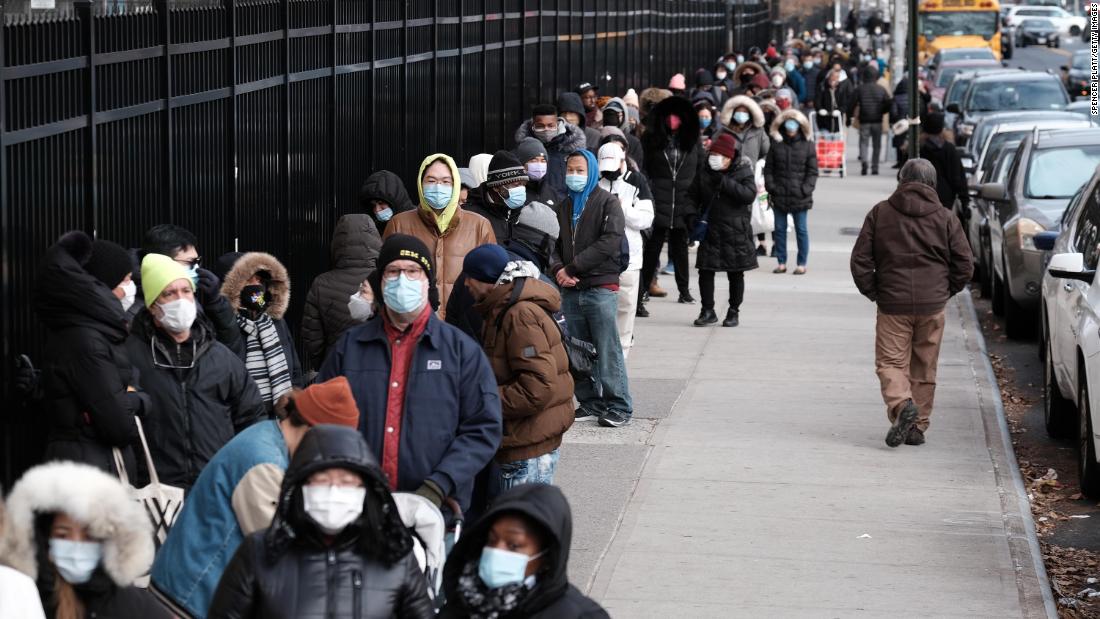While Gov. Kathy Hochul said data confirmed Omicron caused less severe illness, the state trend in hospitalizations is still shooting up
Do you have a sore throat, a runny nose and muscle aches? It could be a common cold, a case of the flu – or Covid-19.
The illnesses all share similar symptoms, sometimes making it hard to distinguish which is putting you under the weather.
Case rates of Covid-19 have been on the rise as the Omicron variant has spread, but hospitalization numbers appear to be staying relatively low. For vaccinated people, evidence suggests that infection with this variant seems less likely to be severe, epidemiologist and former Detroit Health Department executive director, Dr. Abdul El-Sayed said.
“The important thing to remember is a vaccine is like giving a ‘be on the lookout’ call to your immune system. So its capacity to identify, target and destroy viruses is so much higher every time we take another boost of the vaccine,” El-Sayed said. “It makes sense that the symptoms you would experience are milder if you have been vaccinated.”
That does not mean, however, that infections shouldn’t be taken seriously, he added, especially when considering the risk of overwhelming health care systems.
“Just because the per-individual risk of severe illness may be lower, that doesn’t mean on a societal level Omicron doesn’t pose a real risk,” he said. “Even a small proportion of a relatively large number can be a relatively large number.”
Many Covid-19 infections may look like a cold or flu. The best way to know is to get a test, said Dr. Sarah Ash Combs, attending physician at Children’s National Hospital.
“Short of getting a test, I would say it’s really tricky to distinguish right now,” Combs said. “We need to just treat cold-ish symptoms in pretty much the same bucket” as Covid-19.
What symptoms to look for:
Early signs of cold, flu and Covid-19 tend to be similar, El-Sayed said.
Both Covid-19 and the flu often cause symptoms such as fever, fatigue, body aches, sore throat, shortness of breath and vomiting or diarrhea, according to the US Centers for Disease Control and Prevention.
Covid-19 infection can be distinguished, however, by the headache and dry cough that often go along with it. The loss of taste and smell that has been the biggest warning sign of a Covid-19 infection is still a possible symptom, though it is less prevalent now than it has been with other variants, El-Sayed said.
“For people who are feeling serious chest pain, particularly with a dry cough that has gotten worse, that’s when you really ought to seek medical attention,” he warned.
The most important factor to consider is exposure.
“If you are starting to feel any of these symptoms, it’s worth asking: Has anybody with whom I’ve come into contact been infected with Covid? It’s also worth isolating and taking a rapid test,” he advised.
Even if you’re not feeling symptoms yet, it may be best to exercise caution if you have been around someone who tested positive for Covid-19.
“I do think it is worth keeping a high suspicion that it could be Covid considering that we have the Omicron variant spreading like wildfire,” El-Sayed added.
At this point, it is safest to treat all cold symptoms carefully, Combs said.
When to test for Covid-19:
It is often good to address your suspicions of Covid-19 by taking a test, although when you do it makes a difference.
If you are feeling symptoms, now is the time to take a test, El-Sayed said.
For those who have been exposed but aren’t feeling symptoms, there is a possibility that the virus hasn’t developed enough to show up on a rapid test, he explained. In those cases, it is best to wait five days after exposure before testing and to remain on the lookout, according to the CDC.
“Just because you get a negative test doesn’t necessarily mean it’s not Covid,” El-Sayed said. “The best approach is to test and then maybe test again in 12 to 24 hours, and if you get two negatives, you can be more certain that it’s not.”
Whether it is Covid-19 or the common cold, it has always been a good idea to isolate while you fight a viral illness, he said. It has become even more important with the risk of spread increasing with Covid-19.
![]()


